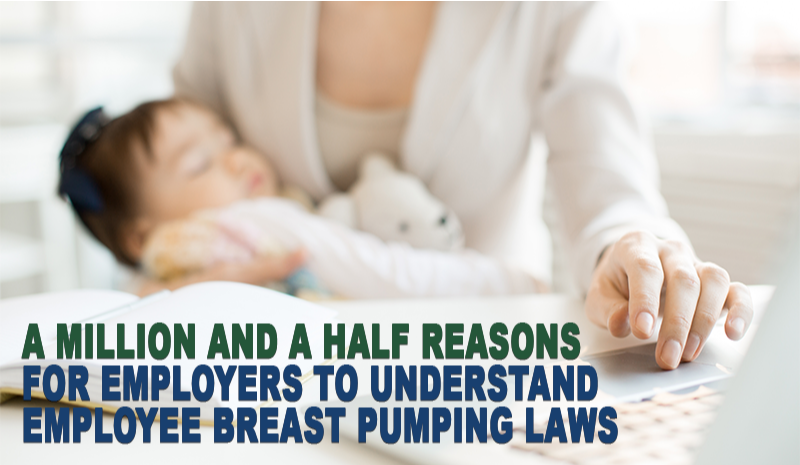
There’s a whole lot happening with employee breast pumping these days. Three weeks ago, a federal jury placed an expensive order at KFC: one bucket of 1.5 million extra-crispy dollars payable to an employee who KFC allowed to pump breast milk only once in each 10 hour shift, first in a bathroom and then in the boss’s office. And get this, there was a running surveillance camera in that office. Looks like the Colonel won’t be making General anytime soon. The case is reminiscent of the singing waitresses’ beef with Ellen’s Stardust Diner in NYC from a few years ago. What’s up with these restaurants and breast milk? The legal framework and requirements for employers are already complicated, but as you’ll see, they’re becoming even more complex.
In 2010, an amendment to the federal Fair Labor Standards Act (“FLSA”) required employers to provide “reasonable” break time for employees to express milk whenever necessary, for up to 1 year after birth. Employers must also provide a private place for pumping other than a bathroom (or the boss’s office). Compensation for the breaks is not required unless the employer pays for other kinds of breaks. The FLSA amendment applies to all employers, but those with fewer than 50 employees can claim economic or practical hardships. The law though includes an unexpected congressional curve ball. The breast pumping provision was written into the overtime section of FLSA, so that employees who are Exempt from overtime are also exempt from the legal protection. This means that employers do not have to provide break time or other accommodations for new mothers who are, for example, executives, professionals, teachers, nurses, computer programmers and software engineers—at least not under FLSA. In fact, the law, widely thought to provide the right to breastfeed at work, actually excludes 1 in every 4 working women. That’s the reason the KFC employee, a manager, sued under federal law protecting against gender discrimination. Another federal court recently decided a case in favor of a woman denied the opportunity to pump at work under the federal Pregnancy Discrimination Act on the theory that the employer failed to provide a reasonable accommodation.
Twenty nine states now have laws specifically addressing the issue. In 2018, New Jersey amended the Law Against Discrimination to make breastfeeding moms a protected class and requiring all employers, regardless of size, to provide a “reasonable accommodation,” defined as sufficient time for pumping and a “suitable room” (which probably means no surveillance cameras). Unlike the FLSA though, the NJ law does not limit the right to pump at work only to the 1st year after birth, meaning that New Jersey babies don’t have to be weaned until they leave for college.
New York is on a whole different level with its Breastfeeding Mothers’ Bill of Rights and the Nursing Mothers in the Workplace Act, which provide the following:
- Employers must inform returning mothers of their rights under the law;
- Breaks can be for up to 20 minutes every 3 hours;
- A private space with a chair and small table must be provided;
- Employees must be allowed to make up time missed while pumping;
These rights are guaranteed for up to 3 years from the date of birth.
And New York City employers — get pumped – because your new special legal requirements become effective on March 18, 2019. That’s right, the day after St. Paddy’s, NYC employers must have a designated, private lactation room with an electric outlet, chair, surface for placing the pump, access to nearby running water and a refrigerator for storage. The city ordinance also requires employers to have a written policy for requesting the lactation room. That policy must:
- Specify the means by which an employee may submit such a request
- Require the employer to respond within a “reasonable” amount of time, not to exceed 5 business days
- Provide a procedure to follow when two or more individuals need to use the room at the same time, including contact information for any required follow up
- State that the employer shall provide reasonable break time for an employee to express breast milk pursuant to Section 206-c of the New York Labor Law; and
- State that if the request for a lactation room poses an undue hardship, the employer and employee must engage in a cooperative dialogue.
Our advice to breastfeeding moms: stay away from the green beer, it’s not good for babies!









